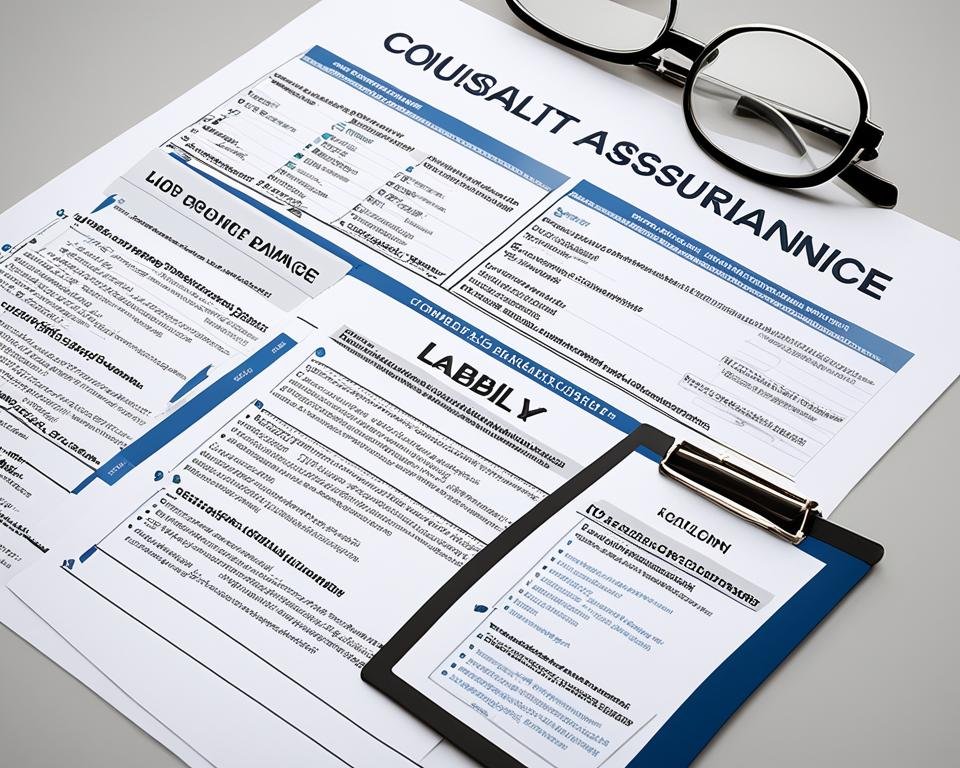As a consultant, you offer your expertise and advice to clients, but with that comes the risk of potential lawsuits or claims of negligence. Liability insurance is crucial for protecting your consulting business from financial losses due to client lawsuits, errors and omissions, and other professional liability risks. But have you ever wondered, how much is your professional reputation worth?
This comprehensive guide will explore the ins and outs of liability insurance for consultants, including the types of coverage, why it’s essential, and how to choose the right policy for your business. Whether you’re just starting out or have an established practice, understanding the importance of liability insurance can make all the difference in safeguarding your consulting enterprise.
Key Takeaways
- Liability insurance protects your consulting business from financial losses due to client lawsuits and claims of negligence.
- Errors and omissions (E&O) insurance is a critical component of liability coverage, covering legal defense costs and damages for mistakes or oversights in your work.
- Choosing the right liability insurance policy requires assessing your specific risks and exposures, as well as considering factors like policy exclusions and industry-specific coverage.
- Implementing risk management strategies, such as carefully reviewing client contracts and maintaining detailed records, can help minimize your liability exposure.
- Understanding contractual liability and indemnity protection provisions is crucial for protecting your consulting business from financial risks.
Understanding Liability Risks for Consultants

As a consultant, you provide valuable advice and services to your clients, but this also exposes your business to various liability risks. Some common types of consultant liabilities include:
Types of Consultant Liabilities
- Errors and omissions – Mistakes or oversights in your work that lead to client losses or damages.
- Professional negligence – Failure to provide the level of care and expertise expected by clients.
- Contractual disputes – Disagreements over the terms of your service agreement.
Consequences of Professional Negligence
The consequences of these liability risks can be severe, potentially resulting in costly lawsuits, damage to your reputation, and financial losses that could jeopardize your entire consulting business. Client lawsuits, errors and omissions, and other financial risks can have a devastating impact on your consulting practice if not properly addressed.
What is Liability Insurance for Consultants?

Liability insurance for consultants is a type of professional liability coverage that protects your business from the financial consequences of claims made by clients or third parties. It helps cover legal defense costs, settlements, and judgments if you’re sued for alleged errors, omissions, or negligence in your professional services.
Key Components of Liability Coverage
The key components of liability insurance for consultants typically include:
- Coverage for claims of negligence, errors, or omissions in your work.
- Protection against third-party lawsuits, including bodily injury and property damage claims.
- Indemnification for defense costs and legal expenses related to covered claims.
By understanding these key components, consultants can ensure they have the appropriate professional liability coverage in place to safeguard their business from the financial risks associated with their profession.
Why Liability Insurance is Crucial for Consultants
Liability insurance is essential for consultants for several reasons. Firstly, it provides financial protection against the potentially devastating costs of lawsuits and claims, which can include legal fees, settlements, and court-ordered damages. Even if you’re ultimately found not liable, the legal defense costs alone can be crippling for a consulting business.
Secondly, liability insurance helps mitigate the risks inherent in your profession, allowing you to focus on providing valuable services to clients without the constant worry of a potential lawsuit. Finally, many clients and contracts may require you to have a certain level of liability coverage, making it a necessary safeguard for your consulting business.
| Importance of Liability Insurance for Consultants |
|---|
| Financial Protection: Covers legal fees, settlements, and court-ordered damages from lawsuits and claims. |
| Risk Mitigation: Helps manage the inherent risks in the consulting profession, allowing you to focus on your clients. |
| Contractual Requirement: Many clients and contracts may mandate a certain level of liability coverage. |
By investing in the right liability insurance policy, consultants can protect their business from the potentially devastating financial consequences of professional liability risks, while also meeting the expectations and requirements of their clients.
Errors and Omissions Insurance for Consultants
Errors and omissions (E&O) insurance is a critical component of liability coverage for consultants. Also known as professional liability insurance, E&O policies protect your business from claims of negligence, errors, or omissions in your professional services. Specifically, E&O insurance covers legal defense costs and damages if a client sues you for mistakes, oversights, or failure to deliver the expected level of service.
What Does Errors and Omissions Insurance Cover?
E&O insurance for consultants typically covers claims related to professional negligence, such as errors or omissions in your work that lead to financial losses for your clients. This can include compensation for client damages, legal defense costs, and settlements or judgments if you’re found liable. The coverage helps safeguard your consulting business from the potentially devastating financial consequences of such claims.
Importance of Errors and Omissions Coverage
Errors and omissions insurance is essential for consultants because even minor mistakes or oversights in your work can result in significant financial losses for your clients. If a client experiences such losses and decides to file a lawsuit, the legal defense costs and potential damages can be crippling for your consulting business, even if you’re ultimately found not liable. Having the right E&O insurance in place helps protect your business from the financial risks associated with errors and omissions insurance for consultants, professional liability coverage, protection against claims, and financial losses.
Liability Insurance for Consultants
When selecting liability insurance for your consulting business, there are several important factors to consider. First, it’s crucial to assess the specific risks and exposures your particular consulting practice faces, as this will help determine the appropriate coverage limits and policy features. This includes evaluating the potential liabilities associated with the services you provide and the industry in which you operate.
Factors to Consider When Choosing a Policy
Additionally, when choosing a liability insurance policy, you should carefully consider the financial strength and reputation of the insurance provider. It’s also important to review the policy’s exclusions and deductibles to ensure they align with your needs and risk tolerance.
Industry-Specific Consultant Liability Policies
Many insurers offer industry-specific liability policies tailored to the unique needs of consultants in various fields, such as IT, management, or marketing consulting. These specialized policies may provide more comprehensive protection and better align with the risks inherent in your specific consulting niche. By selecting an industry-specific policy, you can ensure your liability coverage is optimized to address the particular challenges and exposures faced by professionals in your field.
Professional Liability Coverage for Consultants
Professional liability coverage, also known as errors and omissions (E&O) insurance, is a crucial component of liability insurance for consultants. This type of policy protects your consulting business from claims of negligence, errors, or omissions in your professional services, even if they don’t result in direct financial losses for your clients. Professional liability coverage can help cover legal defense costs, settlements, and judgments if a client or third party sues you for mistakes or oversights in your work.
Protecting Your Business from Third-Party Claims
Having professional liability coverage in place helps safeguard your consulting business from the potentially devastating financial consequences of liability claims, allowing you to focus on providing high-quality services to your clients. This protection is essential, as third-party liability claims can arise even if your work does not directly impact a client’s bottom line. With the right professional liability coverage, you can have the peace of mind to concentrate on your core consulting services without worrying about the potential financial risks associated with allegations of professional negligence or errors.
Risk Management Strategies for Consultants
As a consultant, safeguarding your business from liability risks requires a multifaceted approach beyond just liability insurance. Implementing effective risk management strategies can help minimize your exposure to potential claims and ensure the long-term success of your consulting practice.
Best Practices for Minimizing Liability Risks
Consultants can adopt several best practices to proactively manage and minimize liability risks. These include:
- Carefully reviewing and negotiating client contracts to ensure clear terms and realistic expectations. This helps mitigate the risk of contractual disputes and misunderstandings.
- Maintaining detailed records of your work and communications with clients. Thorough documentation can provide valuable evidence in the event of a claim or lawsuit.
- Implementing quality control processes to catch and correct errors or oversights before they can lead to client losses or damages. This demonstrates your commitment to delivering high-quality services.
- Providing comprehensive and well-documented services to clients, leaving no room for ambiguity or misinterpretation of your work.
- Continuously expanding your knowledge and staying up-to-date with industry trends, regulations, and best practices. This helps you maintain a high level of expertise and reduce the risk of negligence claims.
By adopting these best practices for risk management, consultants can bolster their professional liability coverage and protect their consulting business from potential claims, strengthening their overall risk management strategies.
Contractual Liability and Indemnity Protection
Consultants should also be aware of the contractual liability and indemnity protection provisions in their service agreements. Contractual liability refers to the obligations and responsibilities you assume under the terms of a contract with a client. Indemnity protection, on the other hand, is a clause that requires one party (such as the client) to compensate the other party (the consultant) for certain losses or liabilities.
Importance of Understanding Contract Terms
Understanding these contract terms is crucial, as they can have a significant impact on the scope of your liability coverage and the financial risks you may face. By carefully reviewing and negotiating contract language, consultants can ensure they have the necessary protections in place to safeguard their business.
| Contractual Liability | Indemnity Protection |
|---|---|
| Refers to the obligations and responsibilities assumed under a client contract | Requires one party to compensate the other for certain losses or liabilities |
| Can impact the scope of your liability coverage | Provides important financial protections for your consulting business |
| Careful contract review and negotiation is crucial | Ensures you have the necessary safeguards in place |
Conclusion
Liability insurance is an essential safeguard for consultants, protecting your business from the financial consequences of client lawsuits, errors and omissions, and other professional liability risks. By understanding the types of liabilities you face, the key components of liability insurance for consultants, and the importance of risk management strategies, you can ensure your consulting business is properly protected.
Whether you’re just starting out or have an established practice, investing in the right professional liability coverage can provide the peace of mind and financial security you need to focus on delivering exceptional services to your clients. By proactively addressing liability risks and securing the appropriate insurance coverage, you can build a strong foundation for the long-term success and sustainability of your consulting business.
Remember, liability insurance is not just a legal requirement or a box to check – it’s a critical investment in the long-term viability and growth of your consulting practice. By prioritizing liability insurance for consultants and implementing robust risk management strategies, you can navigate the complex landscape of professional liability with confidence and continue to provide valuable services to your clients without the constant worry of potential lawsuits or financial ruin.
FAQ
What is liability insurance for consultants?
Liability insurance for consultants is a type of professional liability coverage that protects your business from the financial consequences of claims made by clients or third parties. It helps cover legal defense costs, settlements, and judgments if you’re sued for alleged errors, omissions, or negligence in your professional services.
Why is liability insurance crucial for consultants?
Liability insurance is essential for consultants for several reasons. It provides financial protection against the potentially devastating costs of lawsuits and claims, helps mitigate the risks inherent in your profession, and is often required by clients and contracts.
What does errors and omissions (E&O) insurance cover for consultants?
Errors and omissions (E&O) insurance, also known as professional liability insurance, protects your consulting business from claims of negligence, errors, or omissions in your professional services. It covers legal defense costs and damages if a client sues you for mistakes, oversights, or failure to deliver the expected level of service.
What factors should consultants consider when choosing a liability insurance policy?
When selecting liability insurance for your consulting business, you should consider the specific risks and exposures your practice faces, the financial strength and reputation of the insurance provider, the policy’s exclusions and deductibles, and whether industry-specific consultant liability policies are available.
How can consultants manage their liability risks beyond insurance?
In addition to liability insurance, consultants can implement risk management strategies such as carefully reviewing and negotiating client contracts, maintaining detailed records, implementing quality control processes, and continuously expanding their knowledge and staying up-to-date with industry trends and regulations.
What is contractual liability, and why is it important for consultants to understand?
Contractual liability refers to the obligations and responsibilities consultants assume under the terms of a contract with a client. Understanding these contract terms is crucial, as they can have a significant impact on the scope of your liability coverage and the financial risks you may face. Carefully reviewing and negotiating contract language can ensure you have the necessary protections in place to safeguard your consulting business.






















